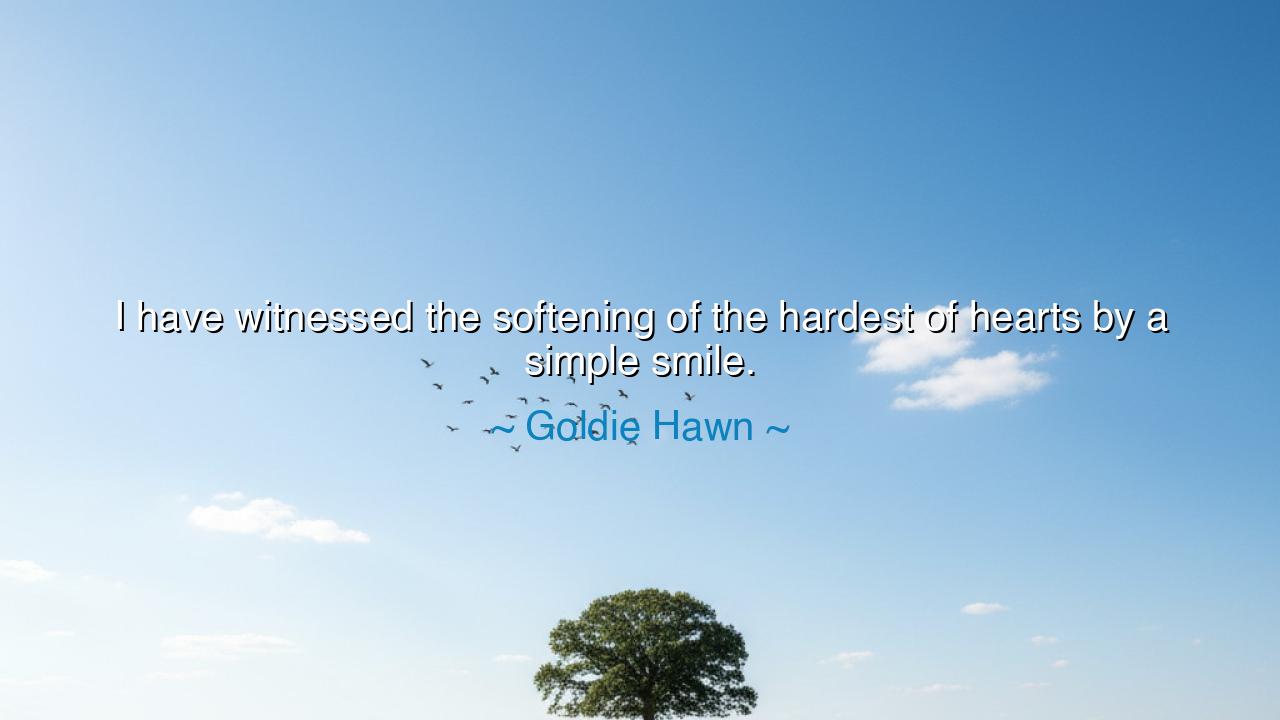
I have witnessed the softening of the hardest of hearts by a






Hear the words of Goldie Hawn, spoken not in jest but in wisdom learned from life: “I have witnessed the softening of the hardest of hearts by a simple smile.” This saying carries the weight of an ancient truth, that what the sword cannot break, and what reason cannot persuade, may yet be melted by gentleness. The smile, so small and effortless, wields a hidden strength, for it reaches not the mind alone but the very soul. Where wrath builds walls of iron and bitterness carves trenches of stone, a single smile may serve as sunlight upon frozen ground, loosening, softening, and awakening warmth where none seemed possible.
The ancients knew of this subtle power. They spoke often of persuasion not by force but by kindness, and likened gentleness to water—soft enough to slip through fingers, yet strong enough to wear away rock. The hardest of hearts, they said, may resist logic, threats, and commands, but it cannot forever resist kindness freely given. And what is the most universal token of kindness if not the smile? It asks for nothing, it costs nothing, and yet it carries within it the breath of peace. Thus, Goldie Hawn’s words echo what sages once taught: the smallest gestures can awaken transformations greater than violence or pride.
History gives us many stories that bear witness to this truth. Consider the tale of Nelson Mandela, imprisoned for decades, hardened by injustice, yet choosing to meet his captors and political enemies with forgiveness and warmth. His smile, gentle yet radiant, softened not only the hearts of his followers but even the hardest adversaries. In that simple gesture, decades of bitterness began to dissolve, and reconciliation became possible. Truly, the smile proved mightier than the chain, the wall, or the weapon.
Even in more personal tales this truth shines. A soldier on the battlefield, hardened by grief and loss, may seem unreachable. Yet letters from home, signed with a drawing of a child’s face and words of love, can break the iron within him. The image of his child’s smile returns to him, softening what war has tried to petrify. In that remembrance of innocence and affection, his humanity awakens again. The world has seen this countless times: when all else fails, tenderness still succeeds.
The meaning of Hawn’s words is therefore clear: the smile is no mere decoration of the lips, but a weapon of peace, a force that pierces armor no blade can cut. The hardest of hearts are not beyond redemption, but they cannot be forced into it—they must be invited, touched, softened. A genuine smile holds such power because it conveys sincerity, compassion, and the quiet assurance that hope is not lost.
The lesson for us is this: never underestimate the force of gentleness. In a world eager to harden itself, in an age where many choose sharpness over tenderness, remember that even the strongest walls can crumble before a steady stream of kindness. To those who despair of changing others, know that transformation begins not with conquest but with love, and often with something as simple as a smile.
Practical action flows naturally. Offer smiles freely, not as empty gestures but as sincere reflections of your compassion. In the face of anger, meet it with calm warmth. In the presence of sorrow, let your smile carry the promise of comfort. And when you encounter the hardened, the bitter, the cold, do not yield to despair—remember that even stone yields to the sun in time. Be patient, be steadfast, and let your gentleness be the force that transforms.
Thus let Goldie Hawn’s wisdom endure: “I have witnessed the softening of the hardest of hearts by a simple smile.” For this is not merely her witness but the testimony of ages—that gentleness is stronger than cruelty, that hope is stronger than despair, and that a single smile can accomplish what armies cannot.






AAdministratorAdministrator
Welcome, honored guests. Please leave a comment, we will respond soon